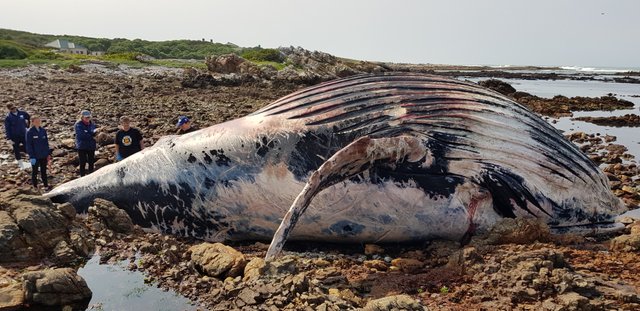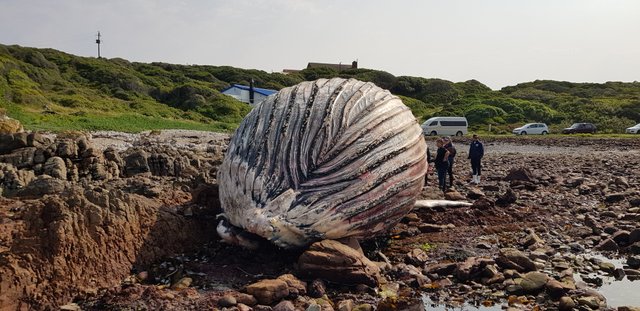Poor lad/lass
I often stumble upon weird and wonderful things while driving around the Western Cape, this day was an exceptionally interesting one.


The day: 21 September 2017
Somehow I got my times mixed up and I was way too early for my meeting, so I decided to go and explore the area a bit. Usually I just rush into an area, get my work done as quick as possible and then move on to the next site. But that day I decided to explore Danger Point which is situated just off Gansbaai in the Western Cape. As I drove through there was nothing really spectacular about it, a nice quiet little town next to the seaside. As I drove closer to the iconic lighthouse I saw a bit of commotion on the rocks, thinking it was people fishing I went in for a closer look. I didn't have to go very close to see what they were looking at.
It is definitely not something you see every day, but unfortunately it is not the first time I have seen a dead whale. It was quite strange to see the whale in the position it was in, lying on its back approximately 200m away from an opening in the rocky shore. It must have been quite a storm that pushed the poor animal out to dry land. The shoreline was littered with kelp which indicated that a storm had passed not too long ago.
It is always sad to see one of these majestic beasts perish in such an unfortunate way. But that is the way of nature, one's misfortune is another's fortune.


It's death was not in vain
As you can see from the pictures there was already a research team present when I arrived. What I could gather is that it was a lead researcher and some students. hopefully something was learned that could prevent future deaths.
South Africa is known for its whale watching, 37 different species of whales and dolphins have been identified around our coastline. Being only a novice whale watcher I can only assume it is the common humpback whale (please correct me if I'm wrong).

Causes of deaths in whales
It has been speculated that man is the number one whale and dolphin killer, some of the ways in which we negatively effect, directly and indirectly kill the whales include:
- Getting tangled in fishing gear or buoy lines.
In False Bay we have octopus traps all along the coastline where the whales like to roam. There have been cases of where the whales get caught in the lines and it can cause drowning. - Boats impacts.
In False Bay we don't have a lot of freighters or large ships but there is always a chance of colliding with them. They spend a large amount of time on the surface during mating season and while raising their calf. - Indirect deaths.
Indirect deaths can be caused due to pollution, which causes infections and the spread of various diseases. Noise pollution, which can disorient the whales and dolphins.
There is not nearly enough research done on the effects of man made acoustics on the animals. In South Africa off the coast of KwaZulu-Natal there has been an increase in whale and dolphin deaths. It has been speculated that this has been due to the increase in oil and gas surveys. During the surveys they set off sounds as high as 200db, whereas the whales can only manage 189db. The increase in noise can disorient them and cause a beaching.

Conclusion
We have to ensure the continuation of the whales and dolphins, it would be such a tragic loss if we were to lose any more of the species. The whale watching industry is a big contribution to the coastal towns, especially Hermanus where the Whale Festival is held each year. If they were to lose the whales and the Festival it would be a big loss to the local economy of the town and surrounding towns. This is only one small town in South Africa, imagine the losses worldwide if we were to lose some of the iconic species.


http://www.whaleroute.com/areas/southafrica/
https://www.livescience.com/23809-human-caused-whale-deaths.html
https://www.iol.co.za/dailynews/whale-and-dolphin-strandings-increase-on-sa-coast-11980993
https://en.wikipedia.org/wiki/Whale_vocalization
Wow, so amazing to have seen this, you live in a beautiful part of this country!
Downvoting a post can decrease pending rewards and make it less visible. Common reasons:
Submit
The Western Cape is an awesome, there is so much to see here.
Downvoting a post can decrease pending rewards and make it less visible. Common reasons:
Submit
Great post man, really enjoying your blog, keep it up!
Downvoting a post can decrease pending rewards and make it less visible. Common reasons:
Submit
Thanks for the support, you are also posting some interesting stuff ;)
Downvoting a post can decrease pending rewards and make it less visible. Common reasons:
Submit
I am very sad to see this whale stranded, where I have experienced this 9 whales stranded in aceh, some can be saved.
Downvoting a post can decrease pending rewards and make it less visible. Common reasons:
Submit
A mass beaching is always bad.
Downvoting a post can decrease pending rewards and make it less visible. Common reasons:
Submit
This is a very tragic event indeed.
Downvoting a post can decrease pending rewards and make it less visible. Common reasons:
Submit
It is, and usually it isn't noticed early enough to be able to do something about it.
Downvoting a post can decrease pending rewards and make it less visible. Common reasons:
Submit
Ok. I don't have much to say either.
Downvoting a post can decrease pending rewards and make it less visible. Common reasons:
Submit
i always gets sad when I see stuff life this.
Downvoting a post can decrease pending rewards and make it less visible. Common reasons:
Submit
Sad to witness the death of such a majestic creature, we are upsetting natures balance with boats, blasting, oil, sad fact is human's take and rarely give.
Downvoting a post can decrease pending rewards and make it less visible. Common reasons:
Submit
It's true, but there is no quick fix for the problem unfortunately.
Downvoting a post can decrease pending rewards and make it less visible. Common reasons:
Submit
Awesome post. Very interesting read!
Downvoting a post can decrease pending rewards and make it less visible. Common reasons:
Submit
Thanks :)
Downvoting a post can decrease pending rewards and make it less visible. Common reasons:
Submit
Great article Chris! It's sad indeed to see such a beautiful giant stranded. Plastic pollution now is a huge whale (and fish) killer. Where I live, dolphins get into a lot of accidents because of reckless bat drivers, and get cut by the boat engines, which is super sad. ..
Downvoting a post can decrease pending rewards and make it less visible. Common reasons:
Submit
It is a big problem, but it is worsened by the lack of reporting. I tried getting some data for the article but couldn't get a lot for our location.
Downvoting a post can decrease pending rewards and make it less visible. Common reasons:
Submit
This post has received gratitude of 1.18 % from @appreciator thanks to: @chr7is.
Downvoting a post can decrease pending rewards and make it less visible. Common reasons:
Submit